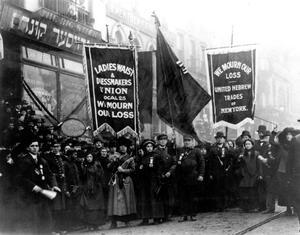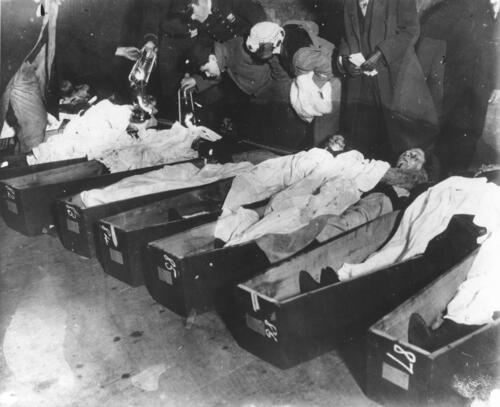Why history is not just about the past
Courtesy of the Kheel Center, Cornell University.
A fire blazes through a garment factory. The building has too few exits and not enough fire escapes. Fire equipment cannot reach the fire. More than 100 people—many of them young women—die. Bodies, burnt beyond recognition, line the floor of a government building, awaiting identification.
If you’re thinking, “I know that story—it happened at New York’s Triangle Shirtwaist Company in 1911,” think again. Though the details fit the Triangle tragedy, the scene I’ve just described is the deadly fire at the Tazreen Fashions factory in Dhaka, Bangladesh, this past Saturday night.
The Triangle fire has been seared into our national memory not only because of the horrific (and unnecessary) loss of life but also because it reminds us that change is possible. The experience of the Triangle fire inspired a generation of activists who fought tirelessly for government safety regulations that transformed American industry.
But it’s a mistake to teach this historic event only as a neatly wrapped historical package, a moving story with an inspiring message. As the most recent Bangladesh fire proves (and the Tazreen Fashions fire is only the latest in a series of factory fires that have killed more than 500 Bangladeshi workers since 2006), 101 years after Triangle, the project of assuring workplace safety for all workers is painfully—and urgently—unfinished. And this remains an American story, even if the fires happen elsewhere in the world; Bangladeshi factories like Tazreen Fashions supply American businesses including Wal-Mart, the Gap, and Tommy Hilfiger.
It was in this spirit that JWA created Living the Legacy, our social justice education project. Living the Legacy explores the roles Jewish men and women played in the American Civil Rights and Labor Movements not only to celebrate the impact that we’ve had on American history and culture, but also to highlight the relevance of our historical experience to the challenges facing the world today. If we study events like the Triangle fire only as part of “history,” we are missing the most important point—that the past is powerful insofar as it informs the present and helps us build a better future.








